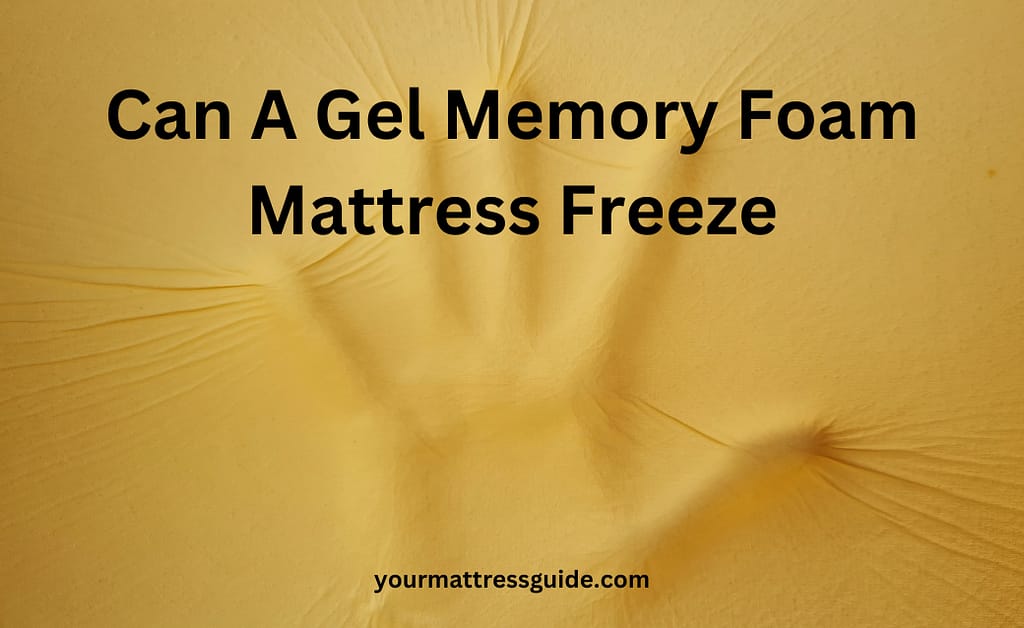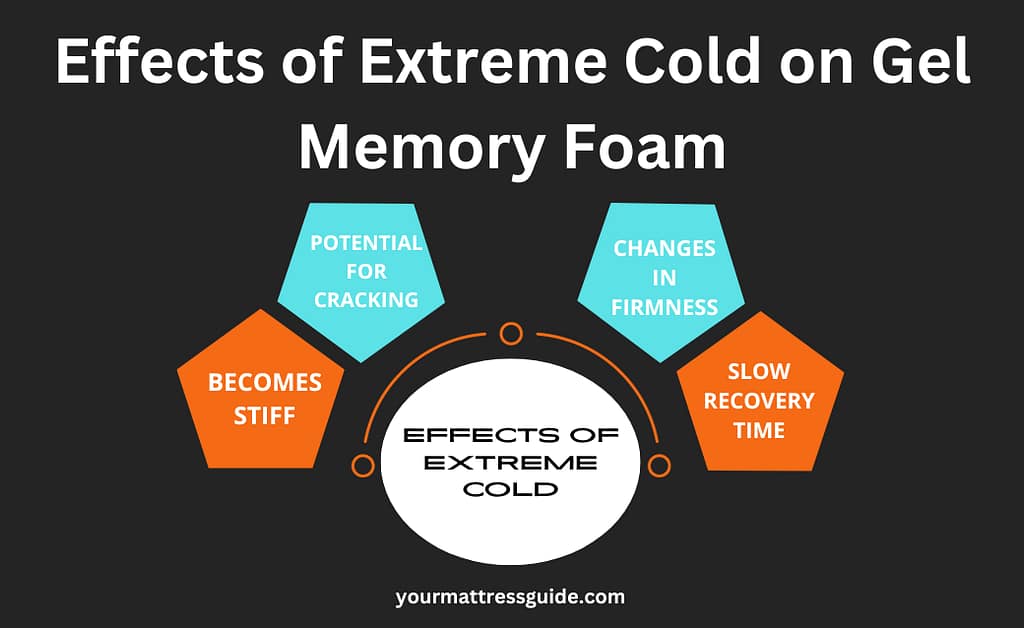Are you wondering if your gel memory foam mattress can freeze in extremely cold temperatures? Well, the answer is yes, it can.
Gel memory foam mattresses are made up of a combination of gel and memory foam, which can be adversely affected by freezing temperatures. When exposed to extreme cold, the gel particles in the foam can become hardened and lose their ability to provide the necessary support and comfort.
This can lead to a night of less restful sleep and potential damage to the mattress. To protect your gel memory foam mattress in cold climates, it is important to take certain precautions.

Can A Gel Memory Foam Mattress Freeze
In this article, we will explore the composition of gel memory foam, the effects of extreme cold on it, the potential consequences of freezing, and provide tips on how to protect your mattress. We will also discuss alternative mattress options that may be more suitable for cold environments.
So, read on to learn more about how to keep your gel memory foam mattress in great condition, even in freezing temperatures.
Can A Gel Memory Foam Mattress Freeze Understanding Composition
When it comes to gel memory foam, understanding its composition is key to unlocking its true potential. Gel memory foam is a type of mattress material that combines the qualities of traditional memory foam with the added benefit of gel particles infused within the foam. This gel infusion helps to regulate the temperature of the mattress and provides a cooler sleeping surface.
The composition of gel memory foam typically consists of a base layer of high-density foam, which provides the overall support and structure of the mattress. On top of this base layer is a layer of gel-infused memory foam, which is responsible for the unique cooling properties of the mattress. The gel particles within the foam are designed to absorb and dissipate heat, helping to prevent overheating during sleep.
The combination of memory foam and gel particles creates a mattress that conforms to the body’s shape, providing optimal support and pressure relief. This can result in a more comfortable and restful sleep experience.
Effects of Extreme Cold on Gel Memory Foam
Exposure to extremely cold temperatures can have adverse effects on the performance and structural integrity of a gel memory foam mattress. Here are some things to consider when it comes to the effects of extreme cold on gel memory foam:
- Gel memory foam becomes stiff: When exposed to extreme cold, gel memory foam can become stiff and rigid, losing its ability to conform to your body’s shape. This can result in a less comfortable sleeping surface and may affect the overall support provided by the mattress.
- Potential for cracking: The extreme cold can cause the gel memory foam to become brittle, increasing the risk of cracking or breaking. This can compromise the structural integrity of the mattress and shorten its lifespan.
- Changes in firmness: Gel memory foam mattresses are designed to provide a balance of comfort and support. However, extreme cold temperatures can alter the firmness level of the mattress, making it feel firmer than usual. This can impact your overall sleep experience and comfort.
- Slow recovery time: Gel memory foam is known for its ability to bounce back and recover quickly. However, in freezing temperatures, this recovery time may be significantly slowed down, resulting in a slower response to pressure and reduced comfort.

It’s important to protect your gel memory foam mattress from extreme cold temperatures to maintain its performance and longevity. Consider using a mattress protector or keeping the mattress in a temperature-controlled environment to prevent potential damage.
Potential Consequences of Freezing Gel Memory Foam
The potential consequences of subjecting gel memory foam to freezing temperatures can be detrimental to its overall quality and durability. When gel memory foam freezes, it undergoes physical changes that can affect its performance and lifespan.
The freezing process can cause the gel particles to become rigid and lose their ability to conform to your body, resulting in a less comfortable sleep surface. Additionally, freezing can cause the foam cells to break down, leading to a loss of support and a shorter lifespan for the mattress.
Another potential consequence of freezing gel memory foam is the risk of damage to the foam structure. When the foam freezes and then thaws, it can experience expansion and contraction, which may cause the foam to crack or break apart. These structural damages can compromise the integrity of the mattress and make it less effective in providing pressure relief and support.
In addition to these physical consequences, freezing gel memory foam may also void the warranty of the mattress. Most mattress manufacturers have specific guidelines regarding the care and maintenance of their products, and subjecting the mattress to extreme temperatures may be considered improper usage. This means that if you freeze your gel memory foam mattress and it gets damaged as a result, you may not be able to claim warranty coverage.
To ensure the longevity and performance of your gel memory foam mattress, it is important to keep it in a temperature-controlled environment and avoid exposing it to freezing temperatures.
Tips for Protecting Your Gel Memory Foam Mattress in Cold Climates
To ensure your gel memory foam mattress stays in top condition in cold climates, it’s essential to take proper protective measures. Freezing temperatures can have a negative impact on the performance and lifespan of your mattress. Here are three important tips to protect your gel memory foam mattress in cold climates:
1. Use a mattress cover: Invest in a waterproof and breathable mattress cover specifically designed for gel memory foam mattresses. This will provide an extra layer of insulation and protection against moisture and cold air.
2. Keep your room temperature regulated: Maintain a consistent room temperature above freezing to prevent your mattress from becoming too cold. Use a space heater or an electric blanket if necessary, but make sure to follow the manufacturer’s instructions and safety precautions.
3. Avoid placing your mattress directly on the floor: Elevate your mattress using a sturdy bed frame or platform to prevent it from coming into contact with the cold floor. This will help maintain the optimal temperature and prevent moisture buildup.
By following these simple tips, you can ensure that your gel memory foam mattress remains comfortable and in excellent condition even in cold climates. Take care of your mattress, and it will take care of you for years to come.
Exploring Alternative Mattress Options for Cold Environments
If you’re looking for a different mattress option to withstand cold climates, consider exploring alternative materials that offer better insulation and warmth. While gel memory foam mattresses can provide excellent comfort and support, they may not be the best choice for extremely cold environments.
Gel memory foam is designed to regulate temperature and provide a cool sleeping surface, which can be a disadvantage in freezing temperatures. The gel beads in the foam can freeze and become less effective in providing comfort.
Instead, you may want to consider mattresses made from natural materials like wool or latex. Wool is a great option for cold climates because it’s naturally insulating and helps retain body heat. It also wicks away moisture, keeping you dry and comfortable throughout the night. Latex mattresses are also a good choice as they provide excellent insulation and have a natural ability to regulate temperature.
Another alternative is to use a heated mattress pad or topper. These can be placed on top of your gel memory foam mattress to provide extra warmth during the winter months. They usually come with adjustable temperature settings, allowing you to find the perfect level of heat for your needs. Let’s check out the article Why Are Mattresses White?
If you live in a cold climate and are concerned about your gel memory foam mattress freezing, it may be worth exploring alternative materials such as wool or latex, or considering the use of a heated mattress pad or topper for added warmth.
Conclusion
So, can a gel memory foam mattress freeze? Yes, it can. Extreme cold temperatures can affect the composition and performance of gel memory foam. Freezing can lead to stiffness, reduced comfort, and potential damage to the mattress. Also check our article on What Is A Gel Infused Mattress.
To protect your gel memory foam mattress in cold climates, consider using a mattress protector, keeping the room temperature regulated, and exploring alternative mattress options that are better suited for cold environments. Stay warm and take care of your mattress!


